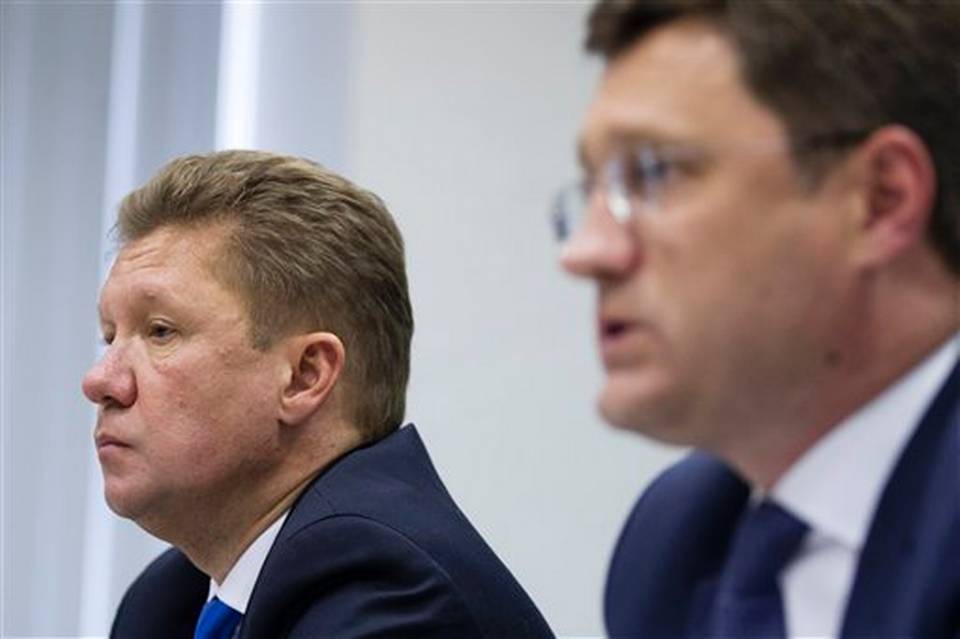
Russia Suspends Natural Gas Supplies to Ukraine
Publication: Eurasia Daily Monitor Volume: 11 Issue: 111
By:

On June 16, Russia suspended natural gas supplies to Ukraine over non-payment of debts for supplies already delivered. Russia would resume the supplies on condition that Ukraine pays in advance for any gas volume that it would request to import from Russia (pre-payment). On that same day, Russian Gazprom filed a multi-billion-dollar case against Ukraine in the Stockholm Arbitration Court over debt repayment. Moscow’s move follows seven rounds of Russian-Ukrainian negotiations brokered by the European Commission, the final round having ended on the night of June 15–16, after midnight (Interfax, June 16).
Gazprom’s CEO Aleksei Miller and Russian Energy Minister Aleksandr Novak announced these actions at a joint news conference in Moscow, while Prime Minister Dmitry Medvedev issued a strongly worded supportive statement, following advance warnings to Ukraine from President Vladimir Putin. These actions are not just Gazprom’s corporate decisions, but political decisions by Russia’s leadership. These measures add a further dimension to Russia’s military and political retaliation against Ukraine’s regime change and turn toward the West.
Officially, at this stage, Gazprom seeks to recover $4.5 billion from Naftohaz Ukrainy for gas delivered to Ukraine during the period November 2013–May 2014. At the level of political rhetoric and warnings, Moscow purports to claim a total of $22 billion in receivables from Ukraine. These would apparently include: 1) straight arrears for past deliveries of gas; 2) compensation for the gas price discount of $100 per one thousand cubic meters, granted by Putin to Ukraine’s then-president Viktor Yanukovych in the April 2010 Kharkiv agreements, but cancelled unilaterally and retroactively by Russia in April 2014; 3) fines for gas volumes not needed and therefore not taken by Ukraine from Russia in recent years under the take-or-pay penalty provisions of the 2009 gas trade agreement; and 4) reimbursement of Russia’s $3 billion loan, disbursed (through purchase of Ukrainian state bonds) in December 2013 to Yanukovych’s government to refinance Ukraine’s debt for past deliveries of Russian gas. Except for this fourth item, the other three claims and their valuation by Moscow seem entirely arbitrary.
The Ukrainian government took the position that it would repay the $4.5 billion debt claim, if Russia would reinstate the price of gas at $268 per one thousand cubic meters. Russia had announced that sweetheart price in December 2013, valid from the first quarter of 2014, rewarding the Yanukovych government for not signing the Association Agreement with the European Union. Following the regime change in Kyiv, however, Moscow raised the gas price to $485 per one thousand cubic meters, effective from April 2014. Moscow arrived at that price by reverting to the oil-indexed pricing formula from the 2009 gas trade agreement, and canceling the $100 discount from the 2010 Kharkiv agreements (Interfax-Ukraine, June 17).
During the negotiations that ended on June 16, Russia hinted that it could reduce the gas price to $385 per one thousand cubic meters (practically, if tacitly, reinstating the $100 discount, and coming close to the average European price level as a result). In return, Moscow sought Ukrainian repayment of the $4.5 billion debt claim, as well as Ukrainian recognition of the continuing validity of the January 2009 gas agreement, with its onerous provisions for oil price indexation and take-or-pay penalties. For its part, Kyiv sought cancelation of those and other provisions of the 2009 agreement, and indicated possible acceptance of a price in the range of $300 per one thousand cubic meters of Russian gas (rather than $268), in return for consenting to repay Moscow’s $4.5 billion debt claim. However, the negotiations broke down without results (see above).
The 2009 agreement runs through 2019. Breaking out of it is key to the new Ukrainian government’s efforts to reform the country’s energy sector in line with the EU’s and the European Energy Community’s standards. The European Commission opposes Gazprom’s anti-competition practices such as oil-indexed prices for natural gas, take-or-pay penalties, or prohibitions on re-exporting Russian gas to third countries. For those and related reasons, EU competition authorities seriously consider imposing fines on Gazprom. In that sense, the Ukraine-Russia 10-year agreement runs counter to European laws and standards. Gazprom has lost several cases brought by European companies before the Stockholm Arbitration court, and has settled several cases out of court, rebating billions of dollars to some European plaintiff companies during the last three years. Naftohaz Ukrainy is undoubtedly looking at those precedents.
Gazprom’s suspension of supplies to Ukraine, and the Gazprom-Naftohaz commercial dispute, need not affect the transit of Russian gas via Ukraine to third countries in Europe. The new Ukrainian government is committed to ensuring unimpeded transit and it works closely with the European Commission in that regard. Gazprom, however, is pre-emptively warning the EU that Ukraine might disrupt the gas transit by withdrawing gas volumes destined for Europe from Ukrainian transit pipelines and storages (Interfax, June 18).
That argument seems designed to pressure the European Commission into lifting its objections to Russia’s South Stream pipeline project, which would bypass Ukraine’s gas transit system. Moscow seeks to portray Ukraine as posing risks to gas transit irrespective of the political color of the government in Kyiv. Having done so during Yanukovych’s rule, as a means of promoting South Stream, the Kremlin is even more interested in discrediting the current pro-Western government of Ukraine as a transit partner. This calculation almost certainly contributed to Moscow’s decision to declare an end to the negotiations with Ukraine on June 16, even though Kyiv had indicated flexibility in the negotiations.




